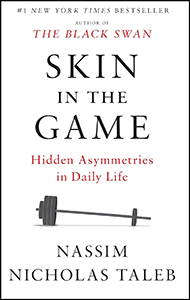Skin In The Game
“Skin in the Game: Hidden Asymmetries in Daily Life” is a book written by Nassim Nicholas Taleb, a scholar and former trader known for his work on probability, risk, and decision-making. Here’s a summary of the key themes and concepts explored in the book:
Concept of Skin in the Game: Taleb introduces the concept of “skin in the game,” which refers to having a personal stake or exposure to the consequences of one’s decisions or actions. He argues that individuals, especially decision-makers and leaders, should bear the costs of their actions to ensure accountability and proper risk management.
Asymmetry and Risk: Taleb discusses the idea of hidden asymmetries in various aspects of life, where risks and rewards are not evenly distributed. He criticizes systems where some parties (like bureaucrats, politicians, or corporate executives) have upside without corresponding downside, which can lead to reckless decision-making.
Ethics and Morality: The book delves into ethical considerations related to skin in the game. Taleb suggests that ethical behavior often emerges naturally when individuals have personal exposure to the consequences of their decisions, as they are less likely to act in ways that harm others or the collective.
Critique of Modern Systems: Taleb critiques modern institutions and systems that lack skin in the game, such as banks, corporations, and governments. He argues that these entities often take risks at the expense of others (taxpayers, shareholders, etc.) without bearing the full consequences of their actions, leading to moral hazard and systemic fragility.
Practical Applications: Throughout the book, Taleb provides practical examples and anecdotes to illustrate his points, ranging from economic policies to medical practices to personal relationships. He encourages readers to apply the concept of skin in the game to their own lives and decision-making processes.
Philosophical Underpinnings: Taleb draws upon philosophical ideas from thinkers like Friedrich Nietzsche and the Stoics to support his arguments about personal responsibility, courage, and the pursuit of truth.
“Skin in the Game” challenges readers to rethink conventional wisdom about risk, accountability, and ethics in both personal and professional domains. It advocates for a world where decision-makers are directly exposed to the consequences of their decisions, promoting a more robust and ethical society.

